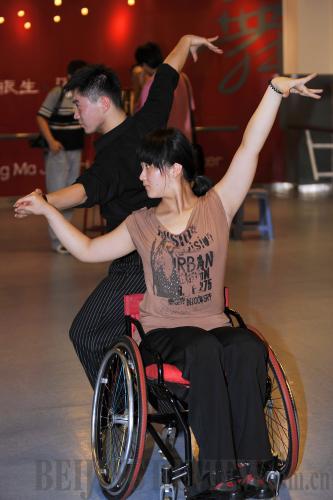|
 |
|
A NEW HOPE: Wheelchair-bound Chen Si and her Latin dance partner rehearse before a performance in Taiyuan, Shanxi Province, on July 6, 2011. Chen beegan suffering from depression after becoming paralyzed following a car crash in 2000, but she managed to recover through dancing (ZHAN YAN) |
Li, a writer, also suffers from depression. His affliction began in 2009. When he was writing a novel in a remote place in southwest China's Sichuan Province in May 2008, an 8.0-magnitude earthquake hit Sichuan and Li was buried alive until he was rescued 76 hours later.
Several months after he was saved, Li found himself possessed by strange thoughts and idea. His apartment at the time was on the 35th floor and he could not help thinking about jumping out of the window over and over, according to Li.
"It is like my body was controlled by a devil," Li said. "Whenever I was awake, the devil was there."
Li's family and friends couldn't understand him and thought he was just seeking attention from others. "I knew I should cherish life more after I was saved, but I didn't and nobody understood me," Li said.
Wang, despite all her sufferings, considers herself as relatively active and positive in seeking treatment. She read all the books that she could find on depression and went to see doctors.
In her imagination, the psychological clinic for depression was decorated in warm colors, but to her disappointment, it was no different from regular hospitals.
"Before I stepped into the clinic, I waited for three hours, thinking about the questions the doctor would ask," Wang said. "Like my childhood experience and my family."
But the whole treatment process only lasted three minutes. The doctor simply asked about her sleeping and her mood and gave her a form with 100 questions to fill in.
"After he reviewed the form I handed in, he told me I was suffering for a mid-level depression and gave me a prescription immediately," Wang said. "It is no different from treating a cold. How could I trust a doctor like this?"
The same happened to Li. "I had been waiting for three hours and could only talk with the doctor for five minutes. During our conversation, the doctor even looked out the door to check how many patients were still waiting," Li said. He complained that, for patients suffering from depression who are already fragile, the attitude of medical professionals can only add to their anxiety and distrust toward them.
Li went through a number of doctors and each doctor of them had a different method for diagnosing and treating depression.
"One said that he only trusts emotions and another does not trust emotions at all. One said that mind can control everything and another said that mind is weak," Li said. "It was very confusing and I had no idea which treatment would be suitable for me."
There are an estimated 350 million people suffering from depression all over the world, but less than 50 percent get effective treatment. However, although the exact cause is not always the same, there are a number of medications on the market that can be used almost universally. Compared to long-term psychological therapy, taking anti-depressants or other medication is becoming increasingly more acceptable, or even preferable, to patients.
Li Cheng was 23 years old when she was diagnosed with depression in 2007. She refused to take medicine at first. "It is definitely a mental problem, so how can the medicine change anything?" she thought. As her symptoms worsened, however, she finally gave in and decided to give medication a chance. To Li Cheng's surprise, the medicine took effect quickly. On the 10th day after she began taking it, she was already feeling considerably better. "The feeling of mental recovery is totally different from that of physical recovery, it is like your soul has been revived," she said.
| 